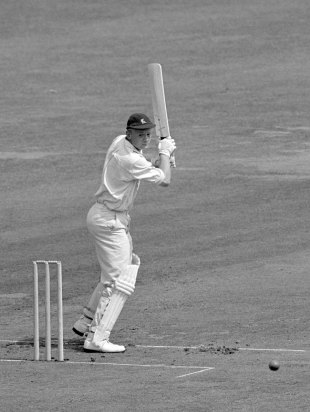David Green

|
|||
|
Related Links
Players/Officials:
David Green
Teams:
Gloucestershire
| Lancashire
|
|||
GREEN, DAVID MICHAEL, who died on March 19, aged 76, was one of the most talented and enigmatic of English county batsmen in the 1960s. He again became a regular on county grounds for nearly three decades from 1982, when his presence was normally advertised by the sound of laughter emanating from the press box. His journalistic career, however, was also somewhat enigmatic.
David Green was a golden boy: Manchester Grammar (when it was still a state school) and Oxford; he was blond, stocky and good-looking. He was a cricket Blue in each of his three years, and might have got a rugby Blue as well. But there were two issues: national service was fading away, so teenagers had to compete against men who had served in the forces; and the Oxford rugby Establishment took a surprisingly dim view of Green's penchant for a few pints. With a leisurely third-class degree, he drifted into county cricket with Lancashire, fortuitously at the very moment the old distinctions were abolished, and Oxford men were no longer expected to play as amateurs. He made his mark with a century against the Australians in 1964, to the delight of Tony Pawson in The Observer.
Green, he said, "has always been carefree and too often merely careless. But he was supremely confident in his stance… The same powerful assurance was reflected in his shots." He also showed a flair that season in the new Gillette Cup. The following year, damp and difficult for batting, Green passed 2,000 runs, mostly opening with Geoff Pullar. But, uniquely, he did so without a single century: 14 fifties, highest score 85. In later years he was ambivalent about this, and called it "part of my wider failure to hit loftier heights as a first-class batsman". It may also have been a sign that, beneath his surface self-assurance, sense of fun and not infrequent truculence, there was a good deal of insecurity. And when his form fell away, the truculence played a part: he called the Lancashire chairman "a prat"; after this led to its predictable conclusion in 1967, he burned his county blazer.
Green found a happy new home at Gloucestershire, where the committee were less censorious, and immediately had another 2,000-run season, this time complete with centuries, including 233 after an epic opening stand of 315 with Arthur Milton at Hove. Green was named one of Wisden's Five Cricketers of the Year. His team-mate Tony Brown gives much credit to Milton for teaching him how to play spin better: "Arthur and Greeny struck up a really good partnership, both in the pub and the field, and he would remind him he couldn't hit every ball for four."
But this phase did not last either and, after two more seasons - when still only 31, but with a young family - Green accepted an offer from Ken Graveney, Tom's brother, to help run his catering business. He carried on for a while in one-day cricket, and was in the Gloucestershire team that lost the epic day/night-but-no-floodlights semi-final at Old Trafford in 1971; he was also able to continue with his club rugby, which had started in the Sale back row and went on to include several West Country sides. But he seemed to have reached a judgment on himself: "My spells of good form were neither long enough nor frequent enough. A worrier by nature, I could at times work myself into a state of virtual paralysis," he reflected in his self-published 2013 memoir, A Handful of Confetti.
He grew bored with business ("proper work," he wrote, "and I was never all that keen on that"), and in 1982, when Tony Lewis suggested he might write regularly for the Telegraph, he jumped at it. And so, for the next 27 years, Green enjoyed life on the cricket and rugby circuits for the daily, and later its Sunday sister. His colleagues much enjoyed having him there, since a day with Greeny meant a stream of high-class anecdotes, insights and playful insults, with a night to follow for those strong enough to keep pace. But little of the joy found its way into the paper: his reports were technically strong, but weak on flavour. "He was a Cavalier at the crease but a Roundhead in print," mused his friend Mark Baldwin, chairman of the Cricket Writers' Club. Friends would urge him to change his style, this time to play more shots; but it seems the self-doubt never left him. He did make peace with Lancashire, and they gave him a new blazer.

